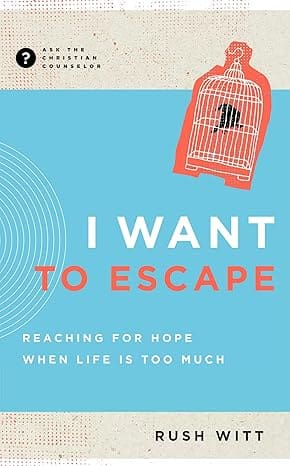- Home
- Spiritual Life
- Reaching for Hope When Life Is Too Much

Reaching for Hope When Life Is Too Much
When life overwhelms, it’s natural to try to get away. Escape holds a powerful allure amid hard times. In every season, a myriad of pressures, challenges, regrets, and disappointments plague our lives. These trials and tribulations often provoke us to cry, “I’ve got to get outta here!” Even though we have many good reasons for trying to escape, as Christians we have even better reasons to depend courageously on our Savior in the ups and downs of life. In I Want to Escape: Reaching for Hope When Life Is Too Much, pastor and counselor Rush Witt helps readers learn to bravely run to Christ instead of running away.
In this interview, we talk to Rush about the different ways we try to escape, and how to run towards God instead.
Q: At one time or another, every one of us has wanted to get away from a situation, but escape isn’t always physically running away. What are some of the most common strategies we utilize to escape when we’re overwhelmed, even if we don’t realize that’s what we are doing?

When we feel overwhelmed by a situation, it’s common for us to engage in activities that help us escape from it. This can range from physical reactions to heart responses. It’s important to recognize that we may not even realize we are using these escape methods, as they often become habitual and automatic responses to stress.
Sometimes we just ignore a situation and pretend it doesn’t exist. Other times we may turn to activities that temporarily distract us, such as watching TV, scrolling through social media, playing video games, or engaging in other forms of entertainment. Those activities can seem rather harmless but can escalate from there. Some people may engage in destructive behaviors such as self-harm or believe that suicide is the only way of escape.
It’s important to recognize that while these escape methods may provide temporary relief from overwhelming situations, they are not healthy or sustainable solutions to our problems. Instead, we need to develop more effective and God-centered ways to address the root cause of our escape desires.
Q: What are the four common ways we seek to escape rather than trust God?
The four common ways that we seek to escape rather than to trust God can be broken down into denial, distraction, deflect/destroy, and death.
Denial ignoring the trouble or temptation that we are facing, hoping that it will go away on its own or pretending that it is not really a problem. We may try blocking out or rejecting reality. Examples include denying that a problem exists, downplaying its significance, or ignoring the situation altogether.
Distraction is another common method of escape, and it is easy to do because we have so many options available to us in our modern world. Distraction involves turning to activities that help us forget about the problem temporarily. We can distract ourselves with entertainment, work, or other activities to avoid dealing with the underlying issues. We all love to enjoy good gifts like social media and other entertainment. But we should also be alert to when our enjoyment moves into the realm of escapism.
Deflect/destroy is a more destructive method of escape, where the anxieties in our hearts can boil over and burn others. It’s an attempt to alleviate the problem by addressing it in a more indirect (yet damaging) way. We lash out at those around us, seeking to deflect attention away from our own problems or to destroy those whom we perceive as being responsible for our troubles. This may also include venting our frustration to others, blaming someone else for the issue, or engaging in destructive behaviors like self-harm.
Death represents the most extreme form of escape which is unfortunately becoming increasingly common today as pressures rise and hope is lost. This includes thoughts or actions related to both self-harm or suicide. While this is a serious concern, it’s essential to remember that there is help available for anyone who is struggling with these types of feelings.
Q: What are the three goals you have for readers of I Want to Escape?
The first goal is to help readers understand why escapism may appeal to them personally. By exploring the various ways in which we use escapism to avoid reality, the book aims to help readers identify their own tendencies and patterns of behavior.
The second goal is to help readers draw near to Jesus as the present person of help and hope. The book explores how our desire for escape can actually be a signal of our need for deeper connection with God. By offering practical tips and insights, the book aims to help readers cultivate a more vibrant and meaningful relationship with Jesus.
The third goal is to help readers develop a practical plan to shape their response to these escapist instincts. I give readers practical tools and strategies to help readers resist the urge to escape and instead face reality with God-dependent courage and grace. The book emphasizes the importance of prayer, gospel hope, and courageous dependence on God in our efforts to overcome the temptation to escape.
Overall, I Want to Escape aims to offer readers a short, practical guide to understanding and overcoming the temptation to escape. By exploring the root causes of escapism and providing practical tools and strategies for change, the book seeks to empower readers to live a more fulfilling and meaningful life in Christ.
Q: What does courageous dependence on Jesus look like? What are the three steps to cultivating that dependence?
Courageous dependence on Jesus is an essential aspect of the Christian life. It means placing our trust in God and relying on his strength, wisdom, and guidance in all aspects of our lives.
- Pray with Humility. This means recognizing our own limitations and weaknesses and acknowledging our need for God’s help. When we pray with humility, we approach God with a spirit of surrender and trust, knowing that he alone can provide the help and support we need.
- Believe with Gospel Hope. This means holding fast to the promises of God’s Word and trusting in his faithfulness, even in the midst of difficult circumstances. When we believe with gospel hope, we anchor our hearts in the truth of God’s love and provision, and we are empowered to face life’s challenges with confidence and courage.
- Act with Courageous Dependence. The final step to cultivating courageous dependence on Jesus is to act with courageous dependence. This means taking bold steps of faith and obedience, even when it’s hard. When we act with courageous dependence, we step out of our comfort zones and into the realm of the place of God’s loving care for us. We trust in his goodness and faithfulness and we are willing to take risks and make sacrifices for his sake.
Overall, cultivating courageous dependence on Jesus is a lifelong journey that requires humility, faith, and action. By praying with humility, believing with gospel hope, and acting with courageous dependence, we can experience the abundant life that God has for us and make a lasting impact on the world around us.
Q: Could you share a little bit about your story and what led you to a passion for counseling?
My passion for counseling was born out of personal experience, watching my wife struggle with depression and anxiety. I saw her go through hospitalizations and different forms of therapy, including talk therapy and electro-convulsive therapy. Despite trying different approaches, we didn’t see much improvement until we were introduced to a biblical counselor in 2002, while I was in graduate school.
This experience opened my eyes to the power of biblical counseling and the hope that it can bring to those who are struggling. I began to see how it offered a holistic approach to mental health that addressed the root of the issues rather than simply treating symptoms. Through my studies and my work as a counselor, I’ve seen time and time again how God’s Word has the power to bring healing and restoration to people’s lives.
I also have a deep conviction that counseling is a vital ministry of the church. The Bible calls us to bear one another’s burdens and to restore each other in a spirit of gentleness (Galatians 6:2). Counseling provides a space where people can come alongside one another in a compassionate, Christ-centered way to help each other grow and heal.
Q: How do you close each chapter of the book?
Each chapter closes with questions for reflection and personal application. The components are intended to help the reader bring their struggles and insights to God, and to ask for his help in addressing their patterns of escape. These are written in a way that reflects the themes and concepts discussed in the chapter and provide a guide for readers to connect with God in a meaningful way.
I believe that prayer is an essential component of the Christian life and that it can be a powerful tool for those struggling with the urge to escape. By directing our thoughts and emotions toward God, we can find comfort, hope, and strength to face the challenges of life with courage and faith.
Overall, my goal in closing out each chapter with these elements is to help the reader engage with the material in a deeper way, and to provide practical tools for them to apply what they’ve learned in their own lives. I hope that by doing so, readers will be able to find freedom from the patterns of escape that have held them back and to experience the abundant life that God has in store for them.
…
Order your copy of I Want to Escape: Reaching for Hope When Life Is Too Much by Rush Witt.
Trending Now
Sign up today for your Inspiration Today Daily Newsletter
Supercharge your faith and ignite your spirit. Find hope in God’s word. Receive your Inspiration Today newsletter now!
Rush Witt
Rush Witt (MDiv, DMin, Southeastern Baptist Theological Seminary) is lead pastor of Paramount Church in Bexley, Ohio, and author of Diehard Sins and I Want to Escape. Rush and his wife Kathryn have five children. Along with his pastoral responsibilities, he works as Acquisitions Editor for New Growth Press and serves as Chaplain for the Bexley Police Department. Rush is a certified biblical counselor with the Association of Certified Biblical Counselors. To learn more: mynameisrush.com
Related Articles
February 12, 2026
How to Get Unstuck from Your Winter Season
If your spiritual life feels cold, stagnant, or weighed down by the past, you may be living in a…
February 11, 2026
Improve Your Blurry Vision
What if the reason you’re stuck isn’t a lack of faith—but blurred vision? This article explores how…
February 10, 2026
God’s One-Eighty: A Testimony of Rejection, Truth, and New Life
She was told God didn’t love her—until the truth set her free. Maybe, like Serena, you’ve believed…
February 9, 2026
The Power of Worship
Worship isn’t just something we do—it’s a way we draw near to God and allow Him to draw near to us.…
Next Steps To Strengthen Your Walk
Inspiration Today Newsletter
Supercharge your faith and ignite your spirit. Find hope in God’s word. Receive your Inspiration Today newsletter now!
Christian Articles
Find articles to strengthen your walk and grow your faith. We have a wide range of topics and authors for you.
Submit A Prayer Request
We are here for you. Simply click on the button below to reach us by form, email or phone. Together we will lift our hearts and voices with you in prayer.





